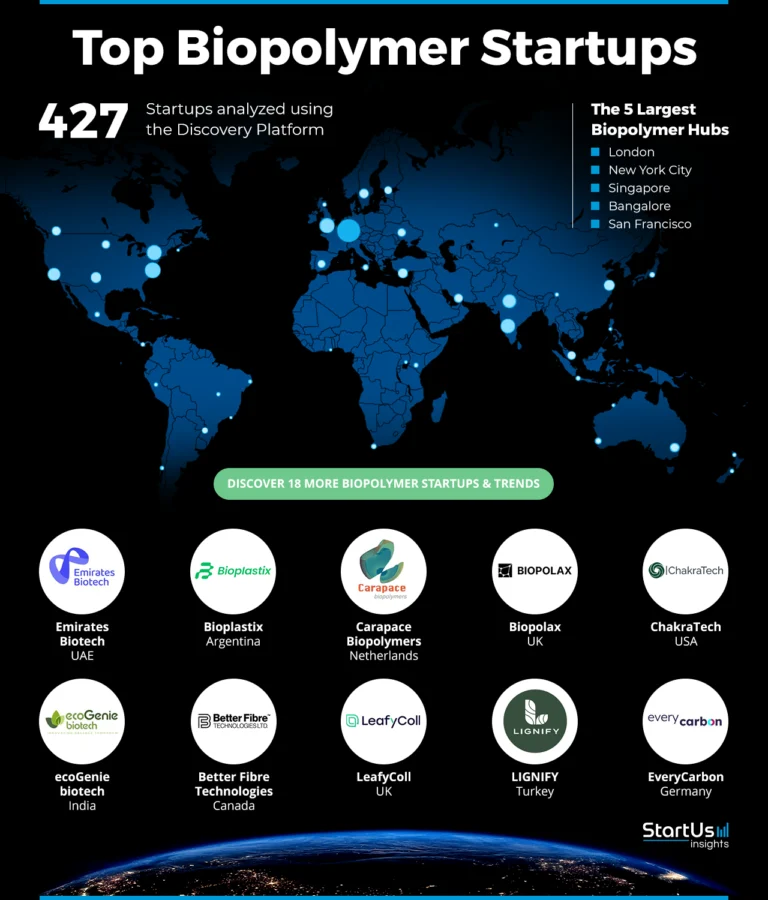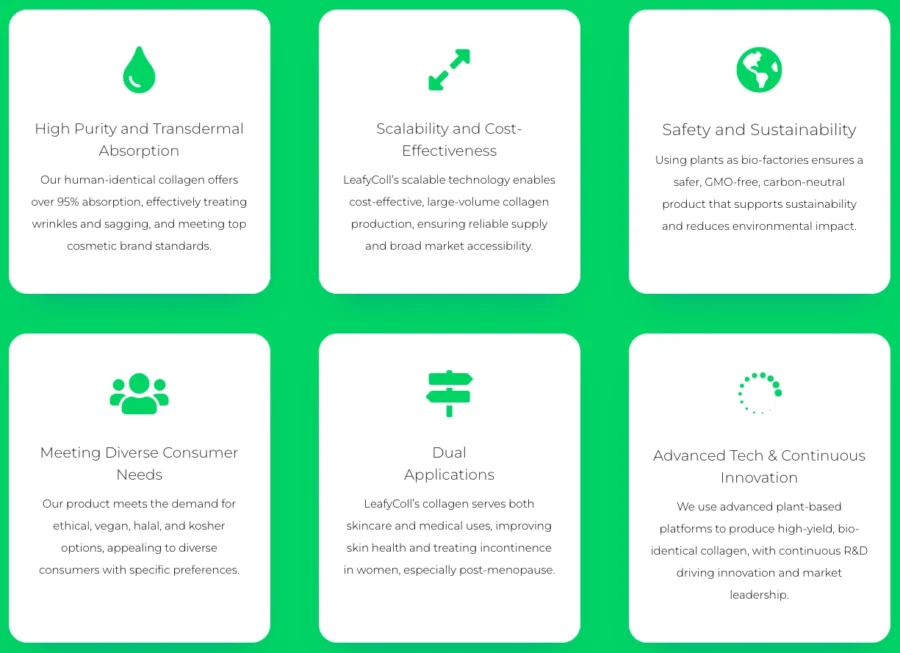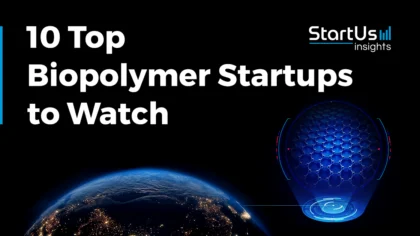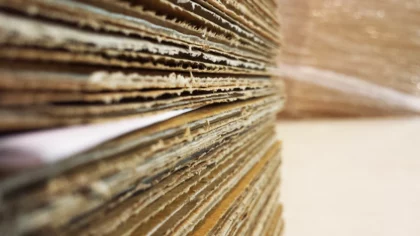Accelerate Productivity in 2025
Reignite Growth Despite the Global Slowdown
Executive Summary: Which are the Top 10 Biopolymer Companies to Watch?
- Emirates Biotech: derives PLA biopolymers from carbon-sequestering plants for sustainable packaging, textiles, and 3D printing.
- Bioplastix: engineers E. coli bacteria that produce tailored PLA and PHB bioplastics from low-cost feedstocks for sustainable materials.
- Carapace Biopolymers: creates bioactive, biodegradable seed and fertilizer coatings and increases plant growth while avoiding microplastics.
- Biopolax: develops plant-based biopolymer additives that replace chemical surfactants in personal, home, and pet care products.
- ChakraTech: deploys AI-engineered microbes to convert carbon waste into biodegradable natural polyesters for fossil-free plastics.
- ecoGenie biotech: produces chitosan from silkworm pupae, which enables soil remediation, water purification, food preservation, and wound healing.
- Better Fibre Technologies: manufactures plant-based lyocell fibers from regenerative sources and replaces viscose in textiles and nonwovens.
- LeafyColl: bioengineers plant biofactories to produce human-identical collagen for cosmetics and medical applications.
- LIGNIFY: creates bio-based leather from lignin waste and offers UV-resistant, water-repellent materials for fashion and upholstery.
- EveryCarbon: converts organic waste into carbon-negative, biodegradable biopolymers for packaging and specialty materials.
Global Startup Heat Map highlights Emerging Biopolymer Companies to Watch
Through the Big Data & Artificial Intelligence (AI)-powered StartUs Insights Discovery Platform, covering over 7M+ startups, 20K+ technology trends, and 150M+ patents, news articles & market reports, we identified 10 biopolymer startups.
The Global Startup Heat Map below highlights emerging biopolymer companies you should watch in 2025, as well as the geo-distribution of 400+ biopolymer companies & scaleups we analyzed for this research.
According to our data, we observe high startup activity in the US and India, followed by the UK. The top 5 startup hubs for biopolymer companies are London, New York City, Singapore, Bangalore, and San Francisco.

Discover Emerging Biopolymer Companies to Watch in 2025
We hand-picked startups to showcase in this report by filtering for their technology, founding year, location, funding, and other metrics. These emerging biopolymer companies work on solutions ranging from bioactive coatings for plant growth and carbon waste to biopolymers, plant-based cellulose, and high-performance biopolymers.
1. Emirates Biotech
- Founding Year: 2023
- Location: Dubai, UAE
- Use For: PLA Biopolymers
Emirates Biotech offers polylactic acid (PLA) biopolymers. It derives the biopolymers using plants that absorb atmospheric carbon.
These PLA biopolymers are biodegradable and compostable and leaves no microplastic residues in the environment. Being recyclable, these polymers are collected, sorted, and reprocessed to make new PLA products. This keeps the resources within the circular value chain.
This way, the startup’s solution allows industries like packaging, textiles, agriculture, electronics, automotive, and construction to switch to a sustainable alternative to conventional plastics.
2. Bioplastix
- Founding Year: 2024
- Location: Buenos Aires, Argentina
- Use For: Bioplastics
Bioplastix is working to scale up the production of bioplastics. It uses an in silico-in vivo optimization approach to engineer Escherichia coli (E. coli) bacteria. These bacteria consume low-cost feedstocks, such as sugars and agricultural waste, to produce biopolymers intracellularly.

Credit: Bioplastix
The startup streamlines the purification process by optimizing bacterial metabolic pathways. This simplifies downstream processing and lowers purification costs.
Moreover, the solution allows control of monomer ratios to produce PLA- and polyhydroxybutyrate (PHB)-based bioplastics with tailored properties. This provides industries like petrochemicals, agribusinesses, and consumer goods with sustainable material alternatives suited to their specific requirements.
3. Carapace Biopolymers
- Founding Year: 2024
- Location: Delft, Netherlands
- Use For: Bioactive Coatings for Plant Growth
Carapace Biopolymers offers a bioactive coating platform, Pomonin. The platform creates biobased and biodegradable coatings for seeds and fertilizers. It integrates microbial biostimulants to improve soil health.
The seed coatings facilitate controlled release of nutrients into the soil and stimulates seed germination. The fertilizer coatings allow farmers to achieve paced nutrition profiles (NUE). The slow-release aspect reduces the application frequency and soil pollution, while boosting crop yields.
The startup’s solution enables industries like food, horticulture, and agriculture to eliminate toxic chemical inputs. It also prevents microplastics from accumulating in the soil.
4. Biopolax
- Founding Year: 2023
- Location: London, UK
- Use For: Plant-based Biopolymer Additives
Biopolax develops plant-based ingredients for home, pet, and personal care industries. Its Glucover Technological Platform creates blends of modified low molecular weight starch- and pectin-based polysaccharides. For example, the Glucover 01 SB/PS is a sulfate-free, rheology modifier for shampoos, shower gels, and childcare products.
The Glucover 02 NP acts as a degreasing agent for ovens, grill cleaners, and laundry gels. It also offers an alternative to ethoxylated surfactants. The Glucover 03 improves the efficiency of bio-surfactant-based laundry formulations.
More products like the Sugartend LG01, a carboxymethylated alkyl polyglycoside (APG), provide a high-foaming, sulfate-free surfactant.
In addition, the Dimereco ZL10 offers polyethylene glycol (PEG)-free boosters for makeup remover micellar waters. These products provide mild, biodegradable, and non-irritant alternatives to chemical additives.
5. ChakraTech
- Founding Year: 2023
- Location: San Diego, CA, US
- Use For: Carbon Waste to Biopolymer
ChakraTech provides a microbial bioprocessing platform that converts excess carbon into biopolymers. It engineers microbes based on bacterial polymer storage pathways using AI-enhanced biotechnology. The bacteria capture carbon and store it as fat reserves, which are used to create natural polyesters.
These materials are biodegradable, providing a fossil-free alternative to conventional plastics. They also reduce soil and marine pollution. Moreover, the carbon feedstock used in the startup’s process provides a cost-effective option being abundant.
Want to Explore 400+ Biopolymer Startups & Scaleups?
6. ecoGenie biotech
- Founding Year: 2023
- Location: Bengaluru, India
- Use For: Chitosan from Silkworm Pupae
ecoGenie biotech uses silkworm pupae to create chitosan, pupal oil, and pupal protein hydrolysates.
Chitosan promotes plant growth by stimulating the production of hormones, such as auxins and cytokinins. Its cationic nature enables electrostatic binding with heavy metals in soil. It removes the metal pollutants and prevents them from spreading further.
It also promotes the growth of beneficial soil microorganisms, such as rhizobacteria and mycorrhizal fungi, which improve the nutrient uptake by plants. This allows farmers to improve crop yields, reduce chemical inputs, and maintain long-term soil fertility and health.
Additionally, chitosan-based coatings have antimicrobial properties, which extend the shelf-life of fruits and vegetables by creating a protective barrier against microbial spoilage.
Chitosan hydrogels remove pollutants like dyes, antibiotics, and heavy metals from contaminated water due to their high adsorption capacity. This supports the development of sustainable water purification systems. Moreover, chitosan’s biocompatibility and ability to boost collagen production improve wound healing.
7. Better Fibre Technologies
- Founding Year: 2024
- Location: Vancouver, Canada
- Use For: Plant-based Cellulose
Better Fibre Technologies converts plant-based raw materials from regenerative forests or agricultural crop residues into cellulosic fibers.
Its BetterCell is a bio-based lyocell fiber derived from wood pulp and provides a sustainable alternative to conventional viscose. BetterHemp is a hemp lyocell that sequesters carbon and regenerates soil.
Moreover, the BetterBamboo use bamboo fibers to inhibit bacterial growth and neutralize odor. Another lyocell fiber, BetterStraw, utilizes wheat straw crop residues to offer eco-friendly straw.
The startup deploys natural enzymes, microbes, steam, and bio-based chemistry in a closed-loop process for their sustainable production. All these materials offer an eco-friendly substitute for applications in nonwovens, textiles, fashion, and home goods.
8. LeafyColl
- Founding Year: 2023
- Location: London, UK
- Use For: Collagen Proteins
LeafyColl offers plant-based collagen for skincare and medical applications. It bioengineers plants to turn them into biofactories that produce human-identical collagen proteins. This process reduces the environmental impact of conventional collagen production.

Credit: LeafyColl
The collagen is biocompatible and offers transdermal absorption. This makes it suitable for cosmetics that improve skin texture and reduce wrinkles or sagging.
Moreover, the startup’s technology facilitates the production of Type 1, 2, and 3 collagen types, unlike fish or bovine sources that provide limited types or pose disease risks.
9. LIGNIFY
- Founding Year: 2023
- Location: Istanbul, Turkey
- Use For: Leather from Lignin
LIGNIFY manufactures bio-based leather. It recycles lignin waste from the paper industry to produce animal-free leather. This leather is suitable for applications in footwear, upholstery, textiles, and accessories.
Being cellulose-free, the LIGNIFY leather does not absorb water and prevents material degradation in humid environments. It also absorbs ultraviolet (UV) light due to its chromophoric groups containing conjugated double bonds and aromatic systems. This gives sun protection when using leather clothing or accessories.
10. EveryCarbon
- Founding Year: 2024
- Location: Tubingen, Germany
- Use For: High-performance Biopolymers
EveryCarbon converts mixed-material organic waste into biopolymer materials. Its technology deploys precision fermentation, microbial conversion, and thermochemical processes to convert waste carbon streams.
The resulting biopolymers provide a biodegradable and carbon-negative material alternative for packaging, coatings, and specialty materials.
The solution further integrates existing waste infrastructure, including on-site mini-plants at wastewater facilities. This way the biopolymer solution combines both chemical manufacturing and waste management and facilitates a circular economy.
Discover All Emerging Materials Startups
The materials startups showcased in this report are only a small sample of all startups we identified through our data-driven startup scouting approach. Download our free Materials Innovation Report for a broad overview of the industry or get in touch for quick & exhaustive research on the latest technologies & emerging solutions that will impact your company in 2025!



![10 Top Startups Advancing Machine Learning for Materials Science [2025]](https://www.startus-insights.com/wp-content/uploads/2025/06/Machine-Learning-for-Materials-Science-SharedImg-StartUs-Insights-noresize-420x236.webp)
![10 Emerging AI Solutions for Material Science [2025]](https://www.startus-insights.com/wp-content/uploads/2025/06/AI-Solutions-for-Material-Science-SharedImg-StartUs-Insights-noresize-420x236.webp)




